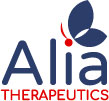Mission
Unlock new targets,
tissues and therapeutic windows,
ensuring safety and accessing genomic sites
that remain inaccessible today.
Alia stems out of pioneering research of Professor Anna Cereseto and Doctor Antonio Casini at Trento University.
Our thesis: The diversity and complexity of human genetic diseases demands a customized approach and relying on a limited set of enzymes wouldn’t suffice.
Portfolio
Alia’s proprietary pipelines, including the PAM Prediction Algorithm, on target directed EVOlution platform, play a crucial role in discovering novel nucleases with tailored advantages for therapeutics applications.
Alia’s vast portfolio of exquisitely selected novel CRISPR Enzymes includes Cas9 and Cas12 systems, expands the range of targetable genomics sites and increases the precision of genetic modifications, it brings gene editing to the next level of specificity and safety.
Pipeline
At Alia we prioritize patients.
Our first pipeline program targets Autosomal Dominant Retinitis Pigmentosa (adRP), a challenging highly heterogeneous genetic disease. Patients with adRP face a lack of therapeutic options. Alia is pioneering a mutation-independent editing strategy using a single AAV vector.
Partnering
At Alia Therapeutics, we extend an invitation to biotech and industry leaders to join forces as partners.
Our collaborative efforts aim to deploy cutting-edge technology and capabilities through co-development or licensing initiatives.
Publications
- CoCas9 is a compact nuclease from the human microbiome for efficient and precise genome editing | Nat. Commun., 2024
- An optimized SpCas9 high-fidelity variant for direct protein delivery – Molecular Therapy, 2023
- Automated identification of sequence-tailored Cas9 proteins using massive metagenomic data – Nat. Commun., 2022
- CRISPR/Cas9 ribonucleoprotein-mediated knockin generation in hTERT-RPE1 cells – STAR Protoc., 2021
- VSV-G-Enveloped Vesicles for Traceless Delivery of CRISPR-Cas9 – Mol Ther Nucleic Acids., 2018
- A highly specific SpCas9 variant is identified by in vivo screening in yeast – Nat. Biotechnol., 2018
